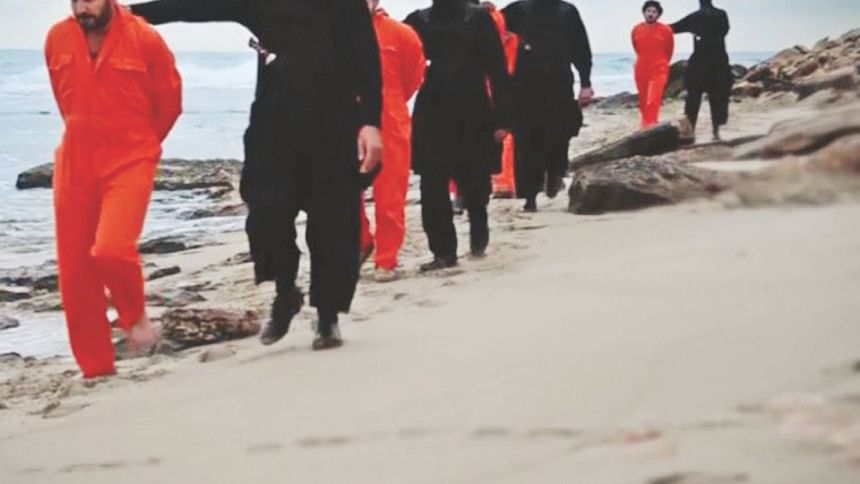Hypocrisy and Orange Jump Suits: ISIS as a Mirror

Apologists, in the cause of shielding Islam from depravity practiced in its name, may discount the evident relationship between the ideology of the "Islamic State" in Iraq and Syria (ISIS) and the increasingly prominent radical Islamic theology. Such an over-protective argument merely contributes to dissonance in the global debate on how to reverse the damage that the precarious structure of shared international values has already suffered. But so does the unqualified outrage emanating from the other side of the polemics, when Western ideals are summoned to be contrasted with "Muslim" practice. History, with its most recent version included, is witness to the sobering reality that cruelty, savagery, and depravity, are not the domain of one "civilisation" at the exclusion of another. While tangible measures are applied to terminating it, the repulsive behaviour of ISIS ought also to be an invitation to the civilized world to fix its gaze on the mirror, and parse its patterns of inconsistency.
ISIS propaganda is saturated with blatant and subtle symbolism to underline its claim that the brutality it inflicts on its victims is retributive, and thus legitimate. Its video release, graphically showing the gruesome burning alive of a Coalition pilot, included lengthy segments depicting victims of alleged coalition raids - civilians, including many children - with atrocious wounds and burns. Continuous references to the "millions" of Muslim victims of Western onslaught are ritualistically made as a preface to the Hollywood-style throat-slitting of captives. The most iconic of the elements invoked to frame ISIS crimes is however the orange jump suit.
Orange jump suits are not part of the traditionally recognized apparel of Middle Eastern prisons. Their infamous entry into the visual lexicon of the region has been through two separate events, each having left an indelible traumatic mark on multiple audiences: Abu Ghraib and Guantanamo.
In 2003, in the Iraqi prison of Abu Ghraib, US occupation personnel, with at best inadequate supervision from their leadership, engaged in massive misconduct against inmates, subjecting them to physical, psychological, and sexual torture — all while taking copious photographs of the acts, to share with friends and family. The image record of this behaviour, which lasted too long to qualify for the excuse of a simple lapse, remains as one of the most nefarious episodes of the US intervention in Iraq. Unfortunately, the grave acts at Abu Ghraib were not the sole incident of grave abuse committed by US personnel. However, through the readily available photographic evidence — from the hooded prisoner about to undergo a mock electrocution, to the pile of naked bodies arranged for the pleasure of smiling US prison guards, through the antics of US men and women against the backdrop of naked Iraqis soiled with a brown matter — Abu Ghraib, and the deeply rooted perception that no adequate punishment followed the revelations of abuse, devastated in the eyes of any claim of ethical standards or just war practice by the United States.
The repulsive depravity to which Abu Ghraib inmates were subjected was forcefully declared as out of line with US standards. Obviously, no such claim is possible for the treatment of prisoners at Guantanamo. Caged, exposed, force-fed, denied basic rights and status, the dehumanization of the sundry captives at Guantanamo — some of whom veteran jihadists, others merely suspected of jihad — set a "standard" that ISIS propagandists have gained a real mastery in invoking. With a record of innovative cruelty, their instrumentalization of the Guantanamo abuses is deeply cynical. However, their argument that the abuse suffered by Guantanamo captives is intentional punishment, only thinly obscured for the purpose of plausible deniability sought by the US righteous self-image, is widely accepted across the Middle East.
Bolstering their accusation of the West of hypocrisy, and foreshadowing a potential ISIS use of chemical weapons, is the assertion that the US attack on Fallujah in November 2004 — one in which white phosphorus was used — in the aftermath of the gruesome killing of US security contractors earlier that year, sought the undeclared collective punishment of Fallujah's residents. Little coverage was accorded to the claims of residents of Fallujah of having suffered a US chemical attack, or to their continuing claims of a resulting surge in birth defects.
In the US cultural consciousness, events associated with the unpopular episode of the Iraq war may have receded to the margins. For many in Iraq, the Middle East, and beyond, incidents of the war — such as the one in Mahmudiyah in 2006, in which a young girl was raped and killed with her family by US armed personnel, who were nonetheless spared the death penalty — have become part of a consistent narrative of ongoing Western depravity and hypocrisy. In his defence, the main accused of the Mahmudiyah crime had asserted "I didn't think of Iraqis as humans." His statement, unfortunately, points to the wider problem of the mutual dehumanization across assumed civilisational lines.
The dehumanisation practiced by ISIS of the Western "other" is manifest, and thus directly condemnable. Any Western national, even if dedicated to help the causes of Muslims, is a trophy to display, torment, and kill for maximal propaganda effect. The dehumanization of the Muslim "other", in official as well as cultural and media circles in the West, may be more subtle but equally damaging and insidious — whether it is the fruit of omission, such as in the ongoing morally indefensible de facto toleration through inaction of countless crimes by governments in the Middle East, against all "responsibility to protect" precepts; or the result of commission, such is produced by drones, with dismal target rates, tolerating the countless victims as acceptable collateral damage.
History, by necessity, creates filters through which classes of excess and abuse are no longer part of the mainline record. Dispossessing native tribes; slavery; carpet, nuclear and chemical bombing of civilian populations are not the deeds of this US generation. Guantanamo, the Iraq war, and the current conduct of war in many theatres of operation, as well as the severe discrepancy between claims of exceptionalism and the reality of negligence, are necessary reflections in the mirror that ought to be resolved if the conviction of a moral high ground against ISIS depravity is to be realized.
The writer is Principal at Middle East Alternatives, Washington DC.

 For all latest news, follow The Daily Star's Google News channel.
For all latest news, follow The Daily Star's Google News channel. 



Comments